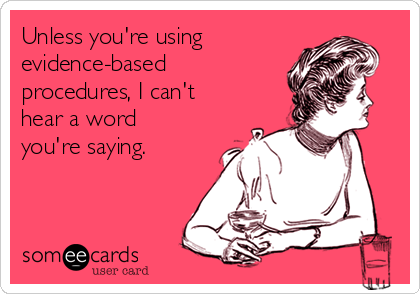This post was inspired by the conversation in StutterTalk episodes 601 and 602, featuring discussion of the parent-authored book Voice Unearthed: Hope, Help and a Wake Up Call for the Parents of Children Who Stutter, written by Dori Holte. I have not read the book, so what follows is not about the book, but rather thoughts about the conversation in these two episodes.
If I could summarize what I took away from StutterTalk episode 602, it would be this:
SLP: Parent, you are telling other parents things about speech therapy and stuttering that are not true, and potentially harmful.
Parent: SLP, speech therapists are telling other parents things about speech therapy and stuttering that are not true, and potentially harmful.
Curiously, both the SLP and the parent in the conversation seemed to hold very similar beliefs about what makes good vs. bad speech therapy, what stuttering is, and holistic communication values. The tone of the episode didn't really reflect this.
This mismatch of beliefs and tone set my wheels turning. How is it that a parent and clinician can share such similar beliefs about stuttering and speech therapy, and yet experience such friction when discussing these topics?
Problem 1: Professional privilege
There was definite agreement between Peter and Dori that overemphasizing speech tools and fluency is problematic at best, harmful at worst. Dori shared briefly about her son's journey through multiple speech therapists, none of whom seemed able to help, even though they were all very kind and well-meaning. Eventually, thankfully, they found a therapist who was able to help their family. Dori stated very clearly that she felt the earlier therapies were not only ineffective, but actually harmful. She watched her son start to shut down under the burden of therapy chores intended to make his speech "better".
This issue of actual harm resulting from therapy is HUGE. It's something we don't talk about a lot within the profession, although it is acknowledged. Most stuttering experts I know dedicate a significant amount of time, energy, and effort to educating fellow SLPs about stuttering. We do this because we are painfully and desperately aware that speech therapy can be harmful, and we want to equip and empower our colleagues to create positive, productive, meaningful change in their stuttering clients. "Good therapy" and "bad therapy" are terms we use freely.
I will happily have a conversation with a fellow stuttering "expert" SLP on the sad state of stuttering therapy in the field at large. I will earnestly listen to parents and adults recall their painful individual stories of bad therapy that only increased their stuttering-life struggles.

*Ahem* Speaking of cubs...
BUT, when a parent or individual makes a broader claim to their peers, "Speech therapy is harmful," I bristle like a mother bear whose cubs have been threatened. THAT IS NOT TRUE!!! I mean sure, it's true in some cases. But not all. In general, my profession does good work. Right?
It's fine for me to criticize my peers, and I acknowledge that personal experience varies wildly. But the public, the laypeople, the uninformed, questioning the quality and integrity of my profession as a whole? I can't stand for that.
You see, even the most knowledgeable non-SLPs don't know what we know. So they aren't really in a position to judge.
I preserve my professional pride (and avoid professional shame) by following this thought process. They just don't get it, so I can take the railings against speech therapy with a grain of salt.
Problem 2: Not all speech therapies are equal
We know there is "good therapy" and "bad therapy". What exactly comprises "good therapy" is going to depend on who you ask. I can almost guarantee you that a client's definition of "good therapy" will not sound like the researcher's "evidence-based" definition.
And, as in any field, the experts do not agree. In just a few weeks, there will be a panel at the national gathering of 14,000+ SLPs debating the merit of fluency-focused vs. holistic approaches. All the panelists are experts with decades of experience.
Dori shared that one of the early therapies her son had was with a board-certified specialist in fluency disorders. They did not have a positive experience, and the approach contributed to the harm.
So, the ASHA-curated experts don't agree. Board-certified specialization is no guarantee that an SLP will employ a certain approach or effect positive results. Oh, and by the way, SLPs themselves consistently report that they don't feel qualified or comfortable treating stuttering.
Basically, if you are a parent of a kid who stutters, and you've never been to speech therapy, and you haven't already attended five NSA conferences and can't list the pros and cons of avoidance reduction therapy vs. prolonged speech off the top of your head...you are SOL.
Have fun playing Russian roulette, Speech Therapist Edition.
"Problem" 3: The community fights back
My snark is intentional. But you know what? If you're a confused, worried parent, that's how it might feel.
And, quite frankly, I do think in many cases families are better off with no speech therapy, than bad speech therapy. It can be a case of damned if you do, damned if you don't. I find it's much easier to do therapy with a 35-year-old, tormented by his stutter for years, who has never received treatment; versus a 22-year-old who has 20 years of therapy that needs to be undone (or, shall I be more diplomatic, "reworked"). Maybe less damned, if you don't.
I agree with Peter and Craig Coleman in episode 601 that there were factually inaccurate and misleading overgeneralizations in the excerpts they read. Yes, a parent may be scared away from speech therapy if Dori's book is the first thing they read about stuttering. They may believe some incorrect factoids. But is that worse than our profession's blithe encouragement to "Go see a speech therapist", without guidance on how to avoid the pitfalls of doing so? Yes, odds of "getting a good one" are increasing, thanks to the dedicated efforts of professional experts and community members alike. But for an average parent in an average-sized town, I really don't know what the realistic betting odds are.
I am not surprised in the least that a parent with a history of multiple harmful speech therapy rounds would make some misleading, sweeping statements when talking to other parents. How would you not? If it truly feels like the majority of supposed "experts" out there don't know what they're talking about, who is going to alert the consumers? Certainly not the experts themselves!

With great power...
Ultimately, if parents are going to hear incorrect information from one side or the other, it's probably better to hear it from a peer. If a fellow parent tells you something that you later learn is not correct, it's relatively easy to tweak your mental framework. But if an institutionally-backed professional portrays an untrue statement as fact, it's going to be a struggle for you to let go of that misinformation.
As professionals, our words and admonishments can haunt parents and children for years. I have adults who grew up going to speech therapy, who fully embrace an acceptance-centric mindset, and yet still feel guilty when they don't use easy onsets. I know parents who regret not "investing" thousands of dollars on promised cures, despite knowing full well that there really is no cure.
What we say, sticks.
Solution: so corny
Both SLPs and parents (and PWS themselves!) are capable of presenting misinformation to others. AS a profession, if we're going to claim authority and expertise, then we should also claim full responsibility when we are wrong.
One of the best things about working in stuttering is that there is a fantastic, passionate, worldwide community. PWS have self-defined what stuttering is, how it should be approached, and what they want from therapy. Stuttering therapy has a history of being pioneered by PWS-SLPs themselves. The forefront of stuttering, in the speech therapy world, is where it is because of the personal experiences of people who stutter.
The voice of the community is sometimes loud and painful to professionals. I usually have to read Did I Stutter posts at least three times in order to neutralize my visceral reactions. It hurts when we are trying to do our best to help people, only to be told by those same people that we are hurting them. We try to point out that we didn't mean it that way, to educate the client so they understand better, or to fall back on the expertise and authority of our profession.
We start talking. Which means we aren't listening.

EBP shaming. It's a thing.
Listening is scary, though. For many SLPs, hearing stories from PWS and parents like Dori means that everything you learned about stuttering therapy is wrong, and now what are you supposed to do? Our job is to do something! (Something evidence-based, to boot.) You are left with scant choices:
- Keep doing the old thing anyway, because it feels safe and comfortable to you and there was some published research that says it's OK.
- Avoid the matter entirely.
- Take a risk and try something new.
Takeaways
Don't be afraid of what you don't know. Don't be afraid of making mistakes.
SLPs: PWS and their parents love talking to SLPs about stuttering and speech therapy. I have never met a PWS who is shy about telling me about bad therapy (**once I make it clear that I won't be offended**). Grad school teaches what good we can do, but nowhere in the KASA is there reference to all the baggage that accompanies our methodologies. If your "therapy" consists of your client talking to you about their own experience, struggles, and tough questions, while all you do is listen, that is pretty good therapy. It's hard to mess up listening!
Parents: As eagerly as you search for positive recommendations, ask for negative ones too. It's sometimes hard for us to articulate why something worked, but we're pretty good at describing why something didn't feel right. When you meet a new therapist, ask "worst case scenario" questions: "What should we do if things just don't work?" Don't be afraid to try, but also don't be afraid to trust your gut.
Everybody: None of us need to get it perfect on the first try. SLPs, you're going to make lots of mistake with all your clients, and even hurt them from time to time. Parents, you're going to give your kid some kind of complex, you know it. It's OK to accidentally do a bit of bad therapy, if you can learn from it to do better therapy. It's OK to take your child to not-the-perfect-therapist, if you can reflect on that experience and use it to create a better one.
Stuttering is all about embracing perceived imperfections. So let's take our own advice.
